Congratulations to all our recent CBR graduates, who walked across the virtual stage and celebrated their UBC convocation in early June!
We had the pleasure of talking with some recent grads, undergraduate and graduate students alike, about their research projects, the best part of their student journey, and their words of wisdom to other researchers.
You can also read the full profiles on our Instagram account at @CBR_UBC.
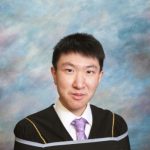
DAVID CHEN |

DIANA CANALS |
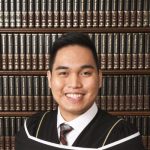
ELIJAH TONGOL |
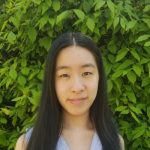
EMILY CHAN |
|
|
|
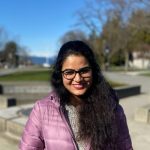
NEHA CHOUDHARY |
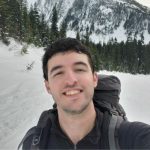
PABLO L. FINKEL |
David Chen, Kizhakkedathu Lab

The circulatory system is my favorite system to study in the human body, so I naturally gravitated towards the CBR to look for research opportunities.
What was your research project about?
My research aimed to modify A+ type red blood cells and hide them from immune system recognition, effectively producing blood that could be used universally for donation. Using a combination of enzyme and polymer grafting techniques, the red blood cell surface could be modified such that surface antigens were cleaved and hidden from antibody recognition.
What inspired you to pursue your program?
I was really interested in how drugs worked and the details behind how they interacted with the human body, which led me to pursue studies in therapeutics and pharmacology. The circulatory system is my favorite system to study in the human body, so I naturally gravitated towards the CBR to look for research opportunities.
What is one piece of advice you would give to an undergrad looking to pursue research?
Don’t be afraid to reach out to research groups who have similar research interests to you! It might seem intimidating to contact a prof at first, but they get emails like this all the time, and you’ll never know what opportunities you’ll find!
Most memorable part of your student experience?
There are so many memories I’ve made that it’s hard to choose just one. I think that doing my directed studies thesis with the Kizhakkedathu lab gave me a truly fulfilling research experience that elevated my passion for scientific exploration.
What do you like to do outside of school?
I like to give my time to volunteer; giving back to the community can feel so rewarding!
Any plans or celebrations after your graduation?
I’m hoping to take it easy during the summer, and take the time to explore the scenery that Vancouver has to offer! It’ll be nice to settle down for a bit now that my undergrad has been completed. As for future plans… probably more school of some sort!
 Diana Canals, McNagny Lab
Diana Canals, McNagny Lab
Spend time building your support/cheerleader squad; it really takes a village! While you are responsible for your own success, you are not in this alone. The research-based graduate experience can be isolating at times and I am very grateful I had a group of people with whom to share both my failures and successes.
What was your graduate student research about?
I studied a protein that makes tumour cells more likely to spread throughout the body. We identified a rare modification of this protein that is only present in tumour cells and even more excitingly, we were able to develop a drug that specifically eliminates these cancerous cells without affecting healthy cells!
Why choose this area of study?
Aside from the burden cancer puts on our healthcare systems, I have always found cancer to be a very interesting disease from a biological standpoint and I really wanted to better understand it and help improve patient care. I chose to pursue this research project because I felt it held a lot of promise and would allow me to both explore my research interests and to contribute to advancing cancer treatments.
What advice would you give a new graduate student?
Spend time building your support/cheerleader squad; it really takes a village! While you are responsible for your own success, you are not in this alone. The research-based graduate experience can be isolating at times and I am very grateful I had a group of people with whom to share both my failures and successes.
Most memorable part of your graduate student journey?
I really enjoyed having the flexibility to participate in lots of different activities. From TA-ing to science communication and entrepreneurship programs, graduate school gave me the freedom to get involved in a variety of different initiatives and allowed me to grow personally and professionally beyond the scope of my research program.
What do you like to do outside of research?
My favourite thing to do on a sunny day is to hang out at the beach with friends. Whether we are playing volleyball, spike ball, or BBQing, as long as I'm out in the sun and looking at the gorgeous mountains, I am happy!
Any special plans after your graduation?
When the pandemic ends, I would like to travel to Spain to see my family, as well as visit some friends around the world!
 Elijah Tongol, Kizhakkedathu Lab
Elijah Tongol, Kizhakkedathu Lab
What was your undergraduate research about?
My project exploits the iron requirement for bacteria to form the extremely resistant structures called biofilms. A biofilm is a multicellular community of bacterial cells that are encapsulated by an extracellular matrix, allowing them to be resistant against antibiotics and cause about 80% of chronic and recurrent microbial infections in the human body. We used the iron chelator HBED conjugated to a polymer called hyperbranched polyglycerol (HPG), in combination with conventional antibiotics, to deprive bacteria of iron and increase the effectiveness of the combined antibiotics.
What inspired you to pursue your program?
I was inspired to pursue the Bachelor of Science in Medical Laboratory Science (BMLSc) program as I wanted to further develop and learn hands-on laboratory techniques that would allow me to effectively navigate my way around the lab. I was also interested in learning about how different laboratory tests are used when making the diagnosis of a disease.
What would you say to an undergraduate interested in research?
You should go for it! It can be challenging and seems to be a lot of work, but the amount of learning and experience out of it will be worth it.
What part of your student experience stands out to you?
When I took PATH 405 – Seminars in Current Topics this school year in the BMLSc program. The setup of this class is so unique and different from all other classes that I have taken previously.
What’s your favourite wild-type (aka non-academic) activity?
I love going on long road trips while listening to music. I also like playing and watching basketball.
How will you be celebrating your graduation?
Just a simple dinner at home with family.
 Emily Chan, Strynadka Lab
Emily Chan, Strynadka Lab
Tell me about your research in the Strynadka Lab.
My project was about purifying and characterizing the structures of potential protein targets for vaccine development against Chlamydia trachomatis, in collaboration with the Brunham lab at the BCCDC. Chlamydia trachomatis is the most prevalent bacterium that causes sexually transmitted infections in humans, and requires the involvement of many proteins to cause these infections. Understanding the structures of these vital proteins can provide a better understanding for a vaccine that reduces Chlamydia trachomatis infections amongst humans.
What inspired you to pursue your program?
In high school, I had a biology teacher who was genuinely passionate and amazed by human anatomy. His enthusiasm for biology inspired me to pursue and learn about something I found fascinating. I decided to study biochemistry because I enjoyed learning about biological systems and became interested in understanding the underlying layer of processes that make things the way they are in our day-to day routines and in the world around us.
What is one piece of advice you would give to an undergraduate looking to pursue research?
Don’t be afraid to ask! As an undergraduate student, it can be daunting to approach researchers about their work and for opportunities within their labs, but most scientists enjoy sharing their work and answering your questions so it will never be a dull conversation!
Most memorable part of your student experience?
It would have to be the experiences I’ve had with the friends I made throughout my undergrad (and eating my first Marbelous cookie at Blue Chip Café, 10/10 would recommend).
What’s your favourite wild-type (aka non-academic) activity? Any plans or celebrations after your graduation?
I love going out for walks in nature trails and parks. I'm also excited to be celebrating my graduation with close friends (via Zoom) and family!
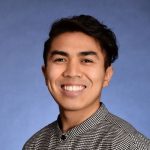 Emmanuel Garrovillas, Conway Lab
Emmanuel Garrovillas, Conway Lab
Tell us about your research.
My research was focused on elucidating the mechanisms of interaction between two proteins, PDGFRα and CD248, and the resulting cellular effects of said interaction in the context of Type II Diabetes.
Why pursue the Biotechnology program at UBC and BCIT?
The Biotechnology program includes two years of intense hands-on lab training at BCIT, which I thought would best prepare me for whatever field in the life sciences I decide to pursue, whether that be in academia or industry! It also has co-op as a graduation requirement, which was a great incentive for finding those internships and dipping my toes into potential career avenues.
What is one piece of advice you would give to an undergrad looking to pursue research?
Don’t be afraid to reach out to your professors to see if you can get involved in their lab!
Tell us about one of the highlights of your time as an undergraduate.
This past school year has been the most memorable part of my student experience. I got to experience campus life as a Residence Advisor without the hustle and bustle of thousands of students roaming around, but also got to experience what it felt like to be fully immersed in my research project in the Conway Lab with my last co-op term.
What do you like to do outside of the lab?
It’s a tie between cycling and rock climbing for me!
What will you do after your graduation?
I’ll be continuing my project with the Conway Lab till August, but if provincial health orders permit it in time, I would like to go on a bikepacking trip this summer!
 Maria-Elizabeth Baeva, Jefferies Lab
Maria-Elizabeth Baeva, Jefferies Lab
What was your MSc project about?
I studied the eyes of a mouse model of Alzheimer's disease. We were interested in seeing whether or not certain pathological hallmarks that are seen in Alzheimer's brains, namely amyloid deposition, hypervascularization and physiological barrier permeability, could also be seen in the eyes, which are an extension of the central nervous system.
What inspired you to pursue your program?
As a kid, I had severe night terrors nearly every single night for roughly ten years. I hated sleeping and couldn't understand why my brain would do this to me. I fell down a rabbit hole trying to solve this and started reading about hypnosis, oneirology and psychology. This led to me being fascinated with neurology. Eventually, I wanted to learn more about how our mind works and (no pun intended) dissecting it for myself. During my Master's, I concurrently worked at a multiple sclerosis clinic and really appreciated the fields of neurology and neuroimmunology both from the clinical and benchtop side. Ironically, the nightmares went away on their own and to this day I have no idea why.
What is one piece of advice you would give to a new grad student?
Network and be friendly. Science is a collaborative endeavor and buying coffee for your lab technician will pay off down the line when you are desperately trying to figure out why your experiment failed for the fifth time.
Most memorable part of your graduate student experience?
Meeting other graduate students. Everyone is so talented, smart, creative, compassionate, community-oriented, engaged, active and passionate. I'm constantly in awe at how incredible and unique these individuals are.
What are some of your favourite non-academic activities?
I'm a huge patron of the arts. Whether it's operas, ballets, plays, symphonies, fashion shows, art galleries or cinema: if it's considered an art, I'm there. I also write in my spare time.
 Neha Choudhary, Orvig Lab
Neha Choudhary, Orvig Lab
What was your graduate student research about?
My research involved the synthesis and investigation of new binding molecules for metal-based radiopharmaceuticals, which can be used for nuclear imaging and therapy.
What inspired you to pursue your program?
I have been interested in medicinal chemistry since I was young, and the potential of small amounts of nuclear energy for diagnosis and therapy intrigued me.
What is one piece of advice you would give a new graduate student?
Always be open to learning; there is no end to learning and exploring.
Most memorable part of your graduate student experience?
Having deep friendships that crossed all barriers of different nationalities, cultures, languages, and food.
What’s your favourite wild-type (aka non-academic) activity?
Biking to UBC via Marine Drive and witnessing the beautiful sunset in summer evenings.
Any plans or celebrations after your graduation?
Sending chocolates to all my families and friends, and having them together over a Zoom call to celebrate, as there is a lockdown in India.
 Pablo L. Finkel, Jefferies Lab
Pablo L. Finkel, Jefferies Lab
Give us an overview of your graduate student research.
My research project was about the biology of type 2 innate lymphoid cells (ILC2s). These cells are heavily involved in the development of allergic reactions; however, they also seem to participate in tumour elimination. For that reason, we characterized these cells in unprecedented detail, learned how to culture them more efficiently, and and scrutinized their potential roles against cancer.
Why pursue this area of study?
I studied Immunology for my undergraduate degree, so I wanted to remain in this beautiful field. The thing is, I am switching now to astrobiology, hence the importance of the microbiological component of the program.
Any words of advice for new graduate students?
Grad school eventually ends, believe it or not, so be organized from day 0 and make the best out of it. Work hard and live to the fullest beyond your program.
Most memorable part of your graduate student experience?
The day I got permission to write my thesis on the phone!
Your favourite wild-type (aka non-academic) activities?
Mountaineering, SCUBA diving, skiing and rock climbing!
Any plans or celebrations after your graduation?
The plan was to go to Nepal, but a certain virus put the world upside down. The next to put the world upside down will be me!


